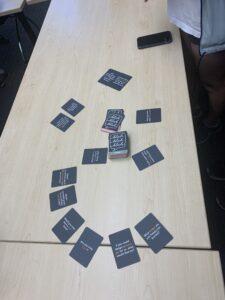For this week’s critical play, I played Love Language, a card game created by Love Lingual Games. This card game targeted towards romantic relationships and loved ones creates a dynamic of intimacy using its different mechanics and an intense amount of vulnerability. The game is adjacent to games such as “If You Really Knew Me,” but specifically includes prompts that are relevant to a romantic relationship. Based on the game instructions, players take turns picking a card and each player would answer the prompt on the card. A core mechanic are the different prompt categories: sex and intimacy, couple, past and future, individual, and family. The purpose behind these categories is to expand the range of topics and conversation that the players engage in, allowing for vulnerability in multiple different contexts. The outcome of this game is fellowship, which in this case, is a type of fun that is achieved through deep questions that encourage the couple to reflect on their individual personal stories, experiences, and opinions.
The questions in this game were very compelling, many of which prompted me to think about things I usually/never think about, but could be important to discuss in a relationship. Some example cards include “What bridges are you happy you burned?” (Category: past and future), “Who’s the black sheep in your family?” (Category: family), and “Have you ever felt like a complete and utter failure?” (Category: individual). These questions are clearly trying to promote a deep level of intimacy for the couple participating. Ideally, having learned more about the players’ stories and perspectives, the couple would learn a lot more about each other and be able to understand each other better moving forward.
Personally, this game put into perspective the importance of play setting for certain games. Some games are designed to be more flexible and playable in many different spaces, while others require that the environment of the space that the player is in while playing be appropriate. We attempted to modify the game in order to play it as a group, but the game night setting wasn’t exactly the safe space required to answer the questions with vulnerability and honesty. All of us ended up sharing answers in a very superficial way. Though the player ultimately has autonomy over how much they share, which story they choose to tell, and the intensity of their response, the nature of these questions still require that the players feel comfortable and safe in order to achieve the level of intimacy that the game is clearly trying to promote. Especially considering that these questions prompt responses that include personal details about their lives as well as the lives of others, the environment of the game space must be condoning of such conversations.
For games targeting romantic relationships such as this one, I wanted to note the importance of inclusivity. One of the categories, “couple,” is branded in a way that is exclusive towards those in non-monogamous relationships. I would suggest that category be renamed to be more inclusive, such as “romance.” For the time that I spent playing the game, I felt that the cards did generalize in a way where the cards could be applicable for many different kinds of relationships, but the “couple” category makes me wonder if all of the cards are actually written in an inclusive way.



